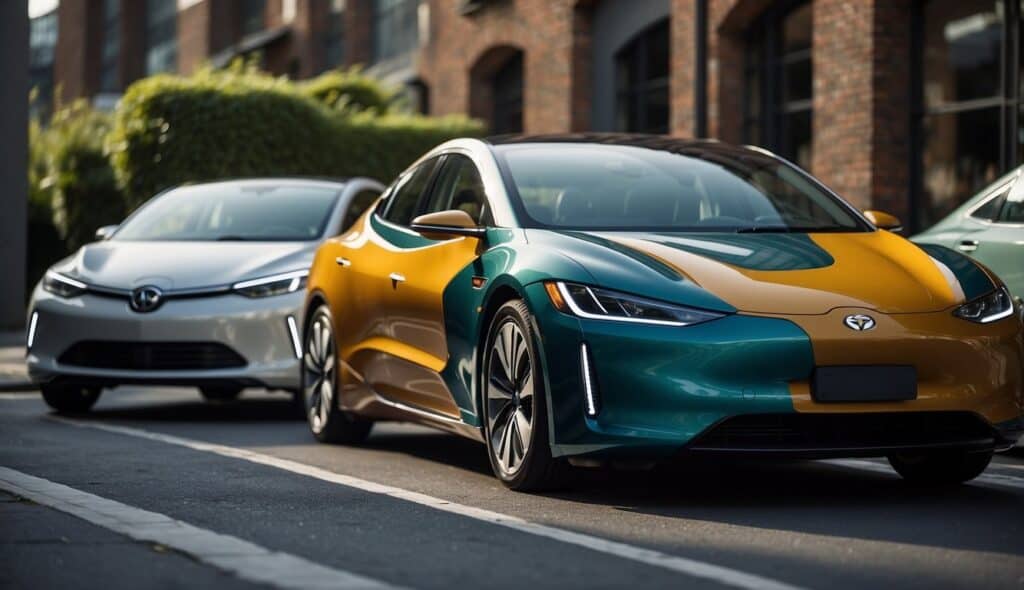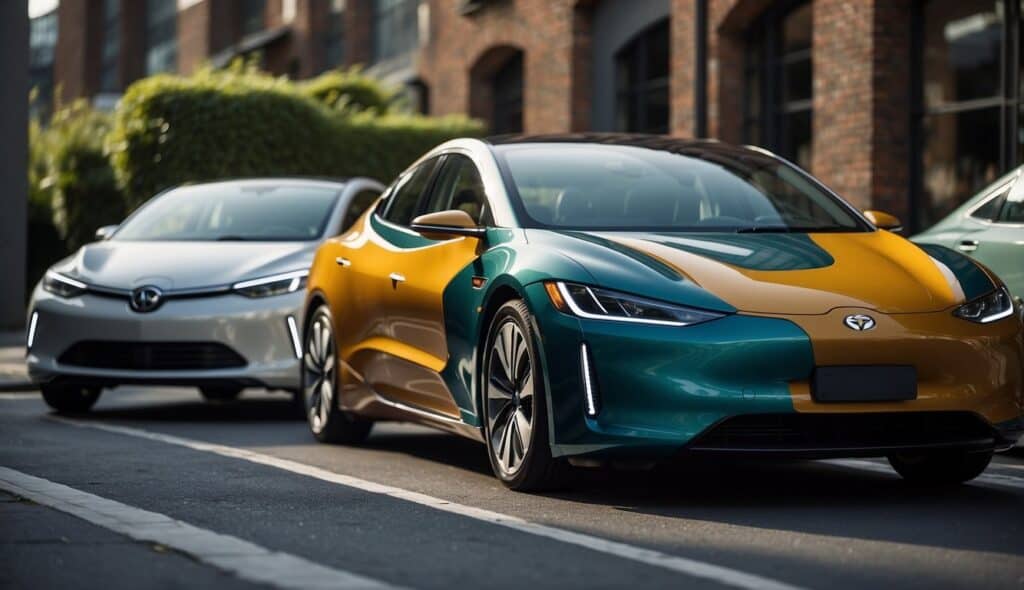Choosing between a hybrid car and an electric car can be a tough decision. Both types have their own benefits and are better suited to different needs and lifestyles.
If you want a vehicle that requires less frequent charging and offers better fuel efficiency than traditional gas cars, a hybrid car might be the best option.
On the other hand, electric cars are known for producing zero emissions, making them a top choice for environmentally conscious drivers.
Hybrid cars combine a gas engine with an electric motor, allowing them to switch between or simultaneously use both power sources. This can lead to significant fuel savings, especially in city driving, where hybrids are particularly efficient.
Hybrids tend to have a lower upfront cost compared to electric vehicles, making them an attractive option for budget-conscious buyers.
Electric cars, or EVs, run entirely on electricity and need to be plugged in to recharge. They offer a smooth and quiet driving experience and are cheaper to maintain than hybrids, as they have fewer moving parts.
They are perfect for those who have easy access to charging stations and wish to reduce their carbon footprint.
Hybrid and electric vehicles are transforming the automotive industry with their unique benefits and features. These vehicles offer alternatives to traditional gas-powered cars and promote sustainability.
Fundamentals of Hybrid Vehicles
Hybrid vehicles, or HEVs, combine a gas engine with an electric motor. This dual system enhances fuel efficiency. The gas engine powers the vehicle during high-speed driving, while the electric motor assists during low-speed driving or idling.
There are also plug-in hybrids (PHEVs), which have larger battery packs that can be recharged by plugging into an electrical outlet. These vehicles can run on electric power alone for short distances.
Regenerative braking in hybrids helps recharge the battery, improving fuel economy by capturing energy during braking and turning it into electricity.
Hybrids are ideal for those looking for improved fuel efficiency without entirely relying on charging stations. They provide a balance between traditional internal combustion engines and electric power, making them a suitable option for drivers not yet ready to commit to fully electric vehicles.

Fundamentals of Electric Vehicles
Electric vehicles (EVs) rely entirely on electric motors powered by a battery pack. They do not have a gas engine, which results in zero tailpipe emissions.
EVs are known for their quiet operation and instant torque, providing smooth and fast acceleration. Charging stations are necessary for recharging EVs, and the availability of these stations is growing rapidly.
The battery pack in an EV requires regular charging from either home charging stations or public chargers.
Although the upfront cost may be higher, the long-term savings on fuel and maintenance can be significant. Advances in battery technology have led to longer driving ranges on a single charge, making EVs more viable for daily use.
Electric vehicles are best suited for drivers with easy access to charging infrastructure and are committed to reducing their carbon footprint. They represent the future of clean transportation by offering a more sustainable and eco-friendly driving option.
Understanding Hybrid and Electric Vehicles
Hybrid and electric vehicles are transforming the automotive industry with their unique benefits and features. These vehicles offer alternatives to traditional gas-powered cars and promote sustainability.
Fundamentals of Hybrid Vehicles
Hybrid vehicles, or HEVs, combine a gas engine with an electric motor. This dual system enhances fuel efficiency. The gas engine powers the vehicle during high-speed driving, while the electric motor assists during low-speed driving or idling.
There are also plug-in hybrids (PHEVs), which have larger battery packs that can be recharged by plugging into an electrical outlet. These vehicles can run on electric power alone for short distances.
Regenerative braking in hybrids helps recharge the battery, improving fuel economy by capturing energy during braking and turning it into electricity.
Hybrids are ideal for those looking for improved fuel efficiency without entirely relying on charging stations. They provide a balance between traditional internal combustion engines and electric power, making them a suitable option for drivers not yet ready to commit to fully electric vehicles.
Fundamentals of Electric Vehicles
Electric vehicles (EVs) rely entirely on electric motors powered by a battery pack. They do not have a gas engine, which results in zero tailpipe emissions.
EVs are known for their quiet operation and instant torque, providing smooth and fast acceleration. Charging stations are necessary for recharging EVs, and the availability of these stations is growing rapidly.
The battery pack in an EV requires regular charging from either home charging stations or public chargers.
Although the upfront cost may be higher, the long-term savings on fuel and maintenance can be significant. Advances in battery technology have led to longer driving ranges on a single charge, making EVs more viable for daily use.

Comparative Analysis
This section discusses the key differences between hybrid and electric cars, focusing on performance metrics, environmental impact, and design and technology.
Performance Metrics
Hybrids and electric vehicles (EVs) excel in different aspects of performance.
Hybrids have an internal combustion engine and an electric motor, allowing them to switch between or combine power sources. This setup often provides better fuel economy and extended driving range compared to traditional gasoline vehicles.
However, electric vehicles offer instant torque and brisk acceleration due to their electric motors, which makes them faster off the line.
Electric cars generally need charging infrastructure, affecting their practicality for long trips. Hybrids, which can run on gasoline, can be more versatile.
Electric cars usually have fewer moving parts, which can lead to lower maintenance costs. However, EVs may have a higher initial cost than hybrids.
Environmental Impact
Electric vehicles are often seen as more eco-friendly because they produce zero tailpipe emissions when operating in electric mode. This helps reduce pollution and dependence on fossil fuels.
EVs are powered by batteries, which can be charged using renewable energy sources, further lowering their carbon footprint. However, the environmental impact of producing and disposing of these batteries is still a concern.
While hybrids are not as green as EVs, they still offer significant emissions reductions compared to traditional combustion engines.
They utilize an electric motor to assist the gasoline engine, improving fuel efficiency and reducing emissions. Hybrids are a good option for those looking to lower their environmental impact without fully committing to an electric vehicle.
Design and Technology
The design and technology behind hybrids and electric cars differ significantly.
Electric vehicles rely solely on battery technology for power. This means they have larger battery packs and advanced powertrain systems to maximize efficiency and driving range.
Modern EVs often feature high-tech infotainment systems, advanced driver-assistance features, and other cutting-edge technologies.
Hybrids combine an internal combustion engine with an electric motor, which can make their design more complex. Since they do not rely solely on electric power, they typically have smaller battery packs than EVs.
This combination allows hybrids to offer electric-only driving modes for short distances while retaining the capability of a traditional gasoline engine for longer trips.
Economic Considerations
Several economic factors come into play when deciding between a hybrid car and an electric car. These include the costs of ownership, the infrastructure for fueling and charging, and the resale value and depreciation over time.
Ownership Costs
Hybrid cars typically have a lower upfront cost compared to all-electric vehicles. For example, a fully electric car may cost an average of $50,798, which is generally higher than a hybrid vehicle.
Maintenance is another factor; hybrids have more moving parts than electric cars, leading to potentially higher maintenance costs.
Electric cars often benefit from federal and state tax credits, which can reduce the initial purchase price.
Insurance costs may also vary; some insurers offer discounts on electric vehicles due to their environmental benefits and lower repair costs.
Operating costs for electric cars are lower since they don’t require gasoline.
Fueling and Charging Infrastructure
Hybrid cars use gasoline, so they rely on the extensive and convenient gas station network. This makes them a practical choice for drivers who travel long distances often, as they can easily refuel anywhere.
On the other hand, electric vehicles need public charging stations and home charging setups.
While the number of public charging stations is increasing, long trips still require planning.
Homeowners can install charging stations at home, but this involves additional costs.
Recharging an electric car is usually cheaper than refueling a hybrid with gas, especially in areas with affordable electricity rates. However, the availability and speed of charging stations can affect convenience.

Resale Value and Depreciation
The resale value of hybrid cars and electric cars differs significantly.
Hybrid cars, such as the Toyota Prius, often retain their residual values better due to brand reputation and proven reliability.
Electric cars can depreciate faster, particularly due to concerns over battery life cycles. However, some models with longer and more reliable battery life may hold their value better.
Kelley Blue Book highlights that understanding these depreciation trends is crucial for buyers.
Electric cars may benefit from lower depreciation rates as charging infrastructure and public acceptance improve. Nonetheless, potential buyers should consider the future value and long-term costs when deciding.
Check out Should I Buy or Lease an Electric Car?
Consumer Considerations
When choosing between a hybrid car and an electric car, buyers have to weigh the availability of different vehicle options and assess how these vehicles fit into their daily lives.
Vehicle Options and Availability
Battery-electric vehicles (BEVs) and plug-in hybrid electric vehicles (PHEVs) come from many manufacturers, offering a variety of choices.
Popular brands like Tesla and Ford provide numerous models. Tesla’s all-electric cars focus on long-range and high performance, while Ford offers a mix of electric and hybrid options.
Toyota is a key player in hybrids. The Toyota Prius is famous for its fuel efficiency.
Overall, electric cars may have fewer moving parts and require less maintenance, but they often have a higher upfront cost than hybrids.
One major consideration is the availability of charging infrastructure for electric cars.
Buyers in areas with many charging stations might find BEVs more convenient. In contrast, hybrid cars do not rely on such infrastructure, making them more versatile in regions with fewer charging solutions.
Lifestyle and Usability
Lifestyle and daily driving habits play a significant role in the decision.
BEVs typically have a range limitation, often between 200-300 miles on a full charge. This range can suffice for daily commuting and short trips but may require planning for longer journeys.
Many electric cars offer instant torque and very quiet operation, adding to their appeal.
PHEVs provide a blend of electric and gasoline power, allowing short trips on electric power alone while having a gasoline engine for extended range. This flexibility can be beneficial for drivers with varied travel distances.
Hybrids, in general, do not need to be plugged in, reducing dependency on charging stations and making them practical for those without easy access to charging.
Read Should I Buy a Used Electric Car?
Looking Toward the Future
Breakthrough technologies and emerging trends are shaping the future of the automotive industry. Environmental and energy policies are also driving the shift towards more sustainable forms of transportation.

Advancements in EV Technology
The advancements in electric vehicle (EV) technology are transforming the way cars are powered and driven.
Innovations in battery packs are crucial. Modern batteries are becoming more efficient, lasting longer, and charging faster, which addresses one of the biggest concerns for potential buyers.
Improved powertrains are also enhancing vehicle performance, providing better torque and acceleration.
Another significant development is solar and wind power integration.
Some EVs are exploring ways to harness renewable energy directly, reducing reliance on conventional charging methods.
Autonomous driving features are also advancing, enhancing safety through improved sensors and navigation systems.
Companies invest heavily in research and development to stay at the forefront of these innovations.
Emerging Trends in Mobility
New trends in mobility are changing how people think about transportation.
Car sharing and electrified public transport are gaining popularity, offering more flexible and sustainable options than traditional car ownership.
These alternatives reduce the number of vehicles on the road, which helps lower emissions.
Electric vehicle innovations are also supporting autonomous driving technologies.
These self-driving cars aim to reduce accidents and improve traffic efficiency.
Another emerging trend is the development of urban mobility solutions, like electric scooters and bikes, which provide convenient transportation for short distances.
Electrified vehicles are also being integrated into smart cities, where they work in harmony with other technologies to create more efficient and sustainable urban environments.
These changes are reshaping the way people commute and interact with their cities.
Environmental and Energy Policies
Government policies are crucial in driving the adoption of EVs.
Federal tax credits and tax incentives make purchasing electric and hybrid cars more appealing to consumers by reducing the overall cost.
These financial benefits help to offset the initial higher purchase price of EVs compared to traditional internal combustion engine vehicles.
There is also a strong push toward using renewable energy.
Investments in solar and wind energy are becoming a priority.
This supports electric vehicles’ power needs and contributes to a more sustainable power grid.
Regulatory measures are focusing on reducing emissions and encouraging the use of cleaner energy sources.
Policies also promote electrified public transport development, offering grants and funding to cities and companies that adopt electrified buses and trains.
These measures aim to create more sustainable transportation networks while reducing the environmental impact of commuting.
Check out Why Can’t an Electric Car Charge Itself While Driving?
Hybrid Car vs Electric Car – Summary
Below is a summary comparing Hybrid Cars and Electric Cars in a tabular format:
| Feature | Hybrid Car | Electric Car |
|---|---|---|
| Power Source | Combines internal combustion engine and electric motor | Fully electric motor, powered by batteries |
| Fuel Type | Gasoline and electricity | Electricity only |
| Emissions | Lower than conventional cars but higher than electric cars | Zero tailpipe emissions |
| Range | Typically longer range due to gasoline backup | Limited by battery capacity, but improving |
| Refueling/Recharging | Can refuel at any gas station, recharges the battery while driving | Requires charging stations, home charging possible |
| Maintenance | Regular maintenance needed for both engine and electric components | Lower maintenance, fewer moving parts |
| Initial Cost | Generally lower than electric cars | Higher initial cost, but falling over time |
| Operational Cost | Higher due to gasoline usage | Lower, electricity is cheaper than gasoline |
| Driving Experience | Smooth, but engine noise present | Quiet, instant torque and smooth acceleration |
| Environmental Impact | Lower than conventional cars, but still reliant on fossil fuels | Minimal, especially if charged with renewable energy |
| Government Incentives | Available in some regions | Often more substantial incentives are available |
This table provides a high-level comparison of the key features and considerations between hybrid and electric cars.
Conclusion
Choosing between a hybrid and an electric car depends on individual needs and preferences.
Hybrid cars typically come with a lower initial cost.
They provide better fuel efficiency than traditional gas-powered vehicles and don’t require charging.
For those worried about range anxiety, hybrids can be reassuring since they use gasoline when the electric battery depletes.
Electric cars, in contrast, have fewer moving parts and provide instant torque, making for a smoother and quicker acceleration.
EVs generally cost more upfront, but they can save money in the long run with lower maintenance and fuel costs.
For daily short commutes, electric vehicles can be very cost-efficient.
Charging infrastructure is improving, making it more convenient for electric car owners.
Comparing Costs and Efficiency:
- Hybrid cars:
- Lower upfront cost
- No need to charge
- Better fuel economy than gas cars
- Electric cars:
- Fewer moving parts
- Lower long-term costs
- Requires access to charging stations
Ultimately, both options contribute to reducing emissions compared to traditional gas-powered cars.
The decision should consider upfront costs, daily driving habits, and access to charging infrastructure.

Hi, I’m Marybeth, an electric car enthusiast living in New York in the USA. As the owner of electriccartalks.com, I love sharing my knowledge on EV tips, battery maintenance, and charging solutions. As a proud Tesla owner, I blend my personal experiences with professional insights to offer valuable information to fellow EV enthusiasts. Through my articles, I aim to empower others to make informed decisions about their electric vehicles. Read more